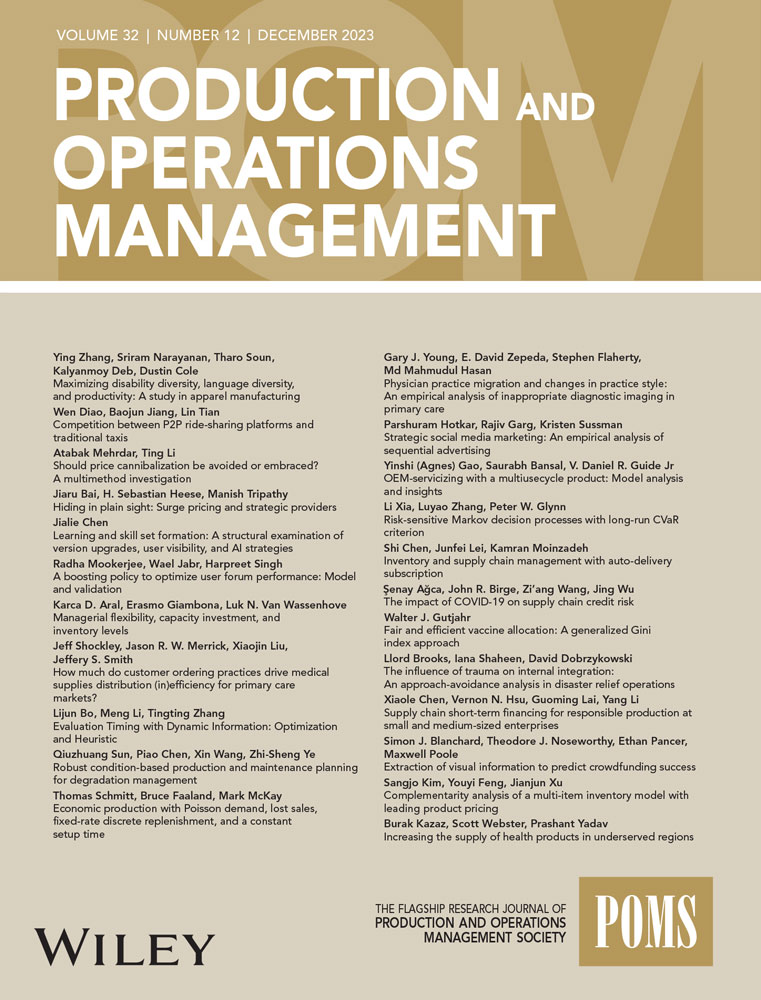与衡量标准保持一致:信息技术和组织衡量标准对高层管理团队认知协调的不同影响
IF 4.8
3区 管理学
Q1 ENGINEERING, MANUFACTURING
引用次数: 0
摘要
在跨职能团队中实现认知协调是组织中一项长期存在的挑战。尤其是在信息系统领域,尽管对这一主题进行了数十年的研究,但战略协调仍然是领导者最关心的问题。在本研究中,我们开发并通过实证验证了一个理论模型,该模型探讨了绩效指标沟通在促进首席信息官(CIO)和高层管理团队(TMT)之间认知协调方面的作用。基于交互式记忆系统的理论视角,我们假设使用信息技术(IT)绩效的特定单位指标和组织绩效的集体指标如何对首席信息官和高层管理团队关系中的互信和共同理解产生不同的影响。通过对 268 名首席信息官的调查、106 名参与者使用新颖的信息技术领导力游戏进行的实验,以及对一份行业出版物中 3200 多篇文章的算法分析,我们发现,使用狭义的信息技术单位指标进行的沟通会提高首席信息官和技术管理团队之间的互信,而使用更广泛的组织指标(以及互信)进行的沟通会提高对信息技术在提高组织绩效方面作用的共同理解。我们的多方法研究为有关 IT 战略调整以及在运营管理中使用绩效指标的丰富文献增添了一个新的重要方面。我们讨论了其对理论和实践的影响,以改善首席信息官和技术管理团队之间的认知协调。我们的模型和研究结果也适用于其他跨职能团队,在这些团队中,专业人员必须相互协作才能实现集体目标。本文章由计算机程序翻译,如有差异,请以英文原文为准。
Aligning With Metrics: Differential Impact of IT and Organizational Metrics on Cognitive Coordination in Top Management Teams
Achieving cognitive coordination in cross-functional teams is a perennial challenge in organizations. It is especially challenging in the context of information systems, where strategic alignment remains a top concern of leaders despite decades of research on the topic. In this study, we develop and empirically validate a theoretical model that explores the role of communicating about performance metrics in fostering cognitive coordination between the Chief Information Officer (CIO) and top management team (TMT). Building on a theoretical lens of transactive memory systems, we hypothesize how the use of unit-specific metrics of information technology (IT) performance and collective metrics of organizational performance can differentially influence mutual trust and shared understanding in the CIO–TMT relationship. Through a survey of 268 CIOs, an experiment with 106 participants using a novel IT leadership game, and an algorithmic analysis of 3200+ articles in a trade publication, we find that communications using narrowly focused IT unit metrics improve mutual trust between the CIO and the TMT, while communications using broader organizational metrics (along with mutual trust) increase shared understanding of IT's role in improving organizational performance. Our multimethod study adds an important new facet to the rich literature on IT strategic alignment as well as the use of performance metrics in operations management. We discuss its implications for both theory and practice in improving cognitive coordination among the CIOs and TMT. Our model and findings are also relevant to other cross-functional teams where specialized individuals must collaborate to achieve collective goals.
求助全文
通过发布文献求助,成功后即可免费获取论文全文。
去求助
来源期刊

Production and Operations Management
管理科学-工程:制造
CiteScore
7.50
自引率
16.00%
发文量
278
审稿时长
24 months
期刊介绍:
The mission of Production and Operations Management is to serve as the flagship research journal in operations management in manufacturing and services. The journal publishes scientific research into the problems, interest, and concerns of managers who manage product and process design, operations, and supply chains. It covers all topics in product and process design, operations, and supply chain management and welcomes papers using any research paradigm.
 求助内容:
求助内容: 应助结果提醒方式:
应助结果提醒方式:


